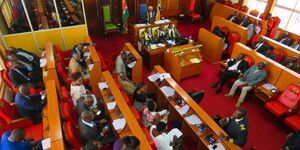Kenya’s deployment of its police to Haiti has hit yet another hurdle after disagreement arose among political parties involved in the formation of the transition council.
In particular, the outgoing Haiti Prime Minister Ariel Henry expressed doubt on the formation of the proposed mediator body, a situation that has cast a grim shadow over the deployment of Kenya police to the Caribbean nation.
The formation of the transition council has been marred by legal disagreement after Ariel termed the transition council unconstitutional and thus illegal.
Reports suggest Henry has since sought advice from CARICOM, the Caribbean regional body overseeing the transition process even as he demands to know the way forward.
The lack of consensus in the formation of the council now poses a huge threat to an already prolonged resolution to ending the wrangles in Haiti.
The current change in tune comes a month after Ariel vowed to step down as the country’s prime minister once the new council is formed.
His call for resignation from the post of Prime Minister was instigated by members of the Haiti gangs who claimed he took power without being elected into office.
According to reports, controversies in the formation of the transition council have thrown the country into a humanitarian crisis with no one to take control of the country.
The latest developments come a month after Haiti and Kenya signed an agreement allowing the deployment of the latter's officers to the multinational mission.
The agreement was signed on March 1, by Interior Cabinet Secretary Kithure Kindiki and the Haiti Security Minister at State House in the presence of President William Ruto and Haiti Prime Minister Ariel Henry.
While meeting the Haiti Prime Minister, Ruto vowed to help Haiti solve the gang problem in the Caribbean nation, noting that the two countries share the same origin.
"We are offering the experience and expertise of our police officers in the Multinational Security Support Mission in Haiti as mandated by the United Nations Security Council and as guided by our courts," Ruto stated.












